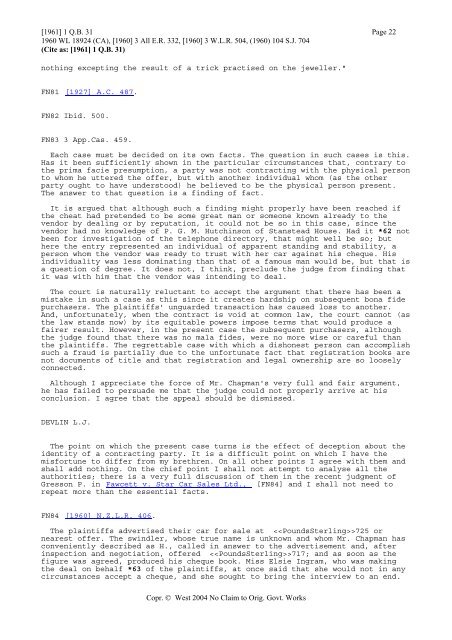Tesco v Constain - Thomson Reuters
Tesco v Constain - Thomson Reuters
Tesco v Constain - Thomson Reuters
Create successful ePaper yourself
Turn your PDF publications into a flip-book with our unique Google optimized e-Paper software.
[1961] 1 Q.B. 31 Page 221960 WL 18924 (CA), [1960] 3 All E.R. 332, [1960] 3 W.L.R. 504, (1960) 104 S.J. 704(Cite as: [1961] 1 Q.B. 31)nothing excepting the result of a trick practised on the jeweller."FN81 H[1927] A.C. 487.FN82 Ibid. 500.FN83 3 App.Cas. 459.Each case must be decided on its own facts. The question in such cases is this.Has it been sufficiently shown in the particular circumstances that, contrary tothe prima facie presumption, a party was not contracting with the physical personto whom he uttered the offer, but with another individual whom (as the otherparty ought to have understood) he believed to be the physical person present.The answer to that question is a finding of fact.It is argued that although such a finding might properly have been reached ifthe cheat had pretended to be some great man or someone known already to thevendor by dealing or by reputation, it could not be so in this case, since thevendor had no knowledge of P. G. M. Hutchinson of Stanstead House. Had it *62 notbeen for investigation of the telephone directory, that might well be so; buthere the entry represented an individual of apparent standing and stability, aperson whom the vendor was ready to trust with her car against his cheque. Hisindividuality was less dominating than that of a famous man would be, but that isa question of degree. It does not, I think, preclude the judge from finding thatit was with him that the vendor was intending to deal.The court is naturally reluctant to accept the argument that there has been amistake in such a case as this since it creates hardship on subsequent bona fidepurchasers. The plaintiffs' unguarded transaction has caused loss to another.And, unfortunately, when the contract is void at common law, the court cannot (asthe law stands now) by its equitable powers impose terms that would produce afairer result. However, in the present case the subsequent purchasers, althoughthe judge found that there was no mala fides, were no more wise or careful thanthe plaintiffs. The regrettable case with which a dishonest person can accomplishsuch a fraud is partially due to the unfortunate fact that registration books arenot documents of title and that registration and legal ownership are so looselyconnected.Although I appreciate the force of Mr. Chapman's very full and fair argument,he has failed to persuade me that the judge could not properly arrive at hisconclusion. I agree that the appeal should be dismissed.DEVLIN L.J.The point on which the present case turns is the effect of deception about theidentity of a contracting party. It is a difficult point on which I have themisfortune to differ from my brethren. On all other points I agree with them andshall add nothing. On the chief point I shall not attempt to analyse all theauthorities; there is a very full discussion of them in the recent judgment ofGresson P. in HFawcett v. Star Car Sales Ltd., [FN84] and I shall not need torepeat more than the essential facts.FN84 H[1960] N.Z.L.R. 406.The plaintiffs advertised their car for sale at 725 ornearest offer. The swindler, whose true name is unknown and whom Mr. Chapman hasconveniently described as H., called in answer to the advertisement and, afterinspection and negotiation, offered 717; and as soon as thefigure was agreed, produced his cheque book. Miss Elsie Ingram, who was makingthe deal on behalf *63 of the plaintiffs, at once said that she would not in anycircumstances accept a cheque, and she sought to bring the interview to an end.Copr. © West 2004 No Claim to Orig. Govt. Works
















